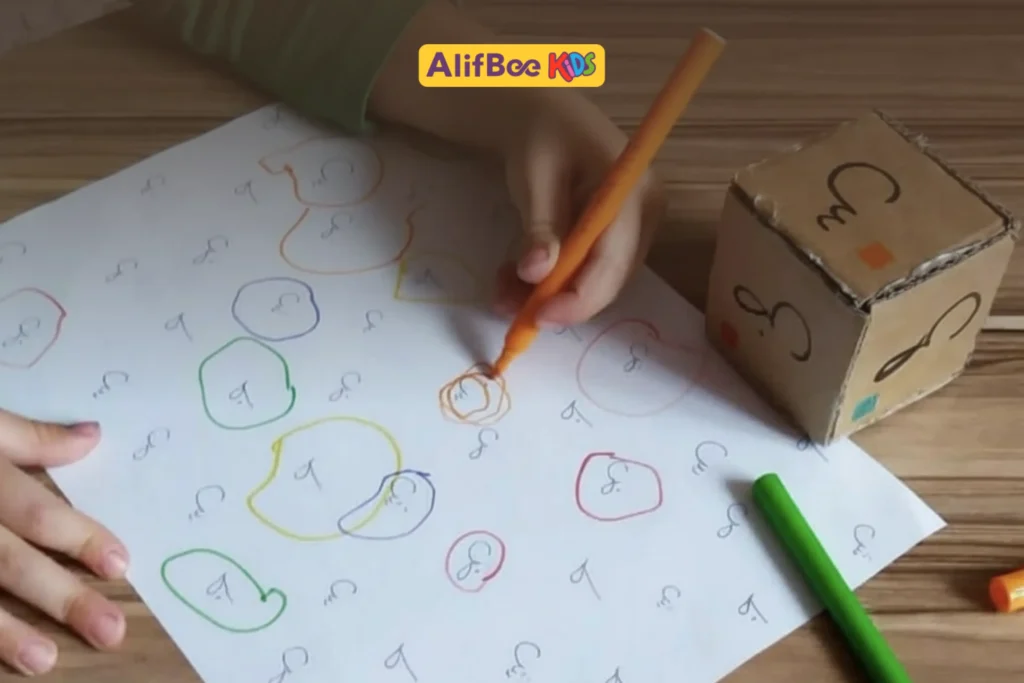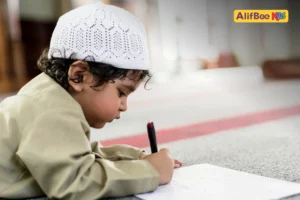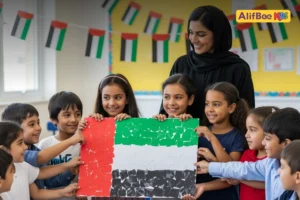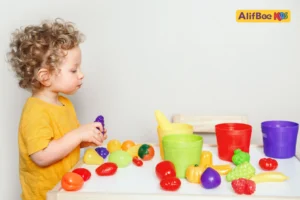Whether you are a non-Arab parent raising your kids in an Arab country or an Arab family parent raising your kid in a non-Arab country, we hear you and we see the struggle you are going through. Raising bilingual kids might not be the easiest mission and keeping a second language alive in your kids’ daily routine may seem like a tough side hassle.
If you have been wondering how to teach kids Arabic at home, in this post we will provide you with 8 fun activities that you can do with your child that will not only keep the kids busy and entertained but will also enhance their Arabic language skills in a fun way.
Activities for Kids to Learn Arabic at Home Naturally
1. Arabic Treasure Hunt
This exciting activity can take less than 10 minutes of prep time and will keep the kids entertained and moving around for much longer. All you need to do is hide a few things then ask your kid to find them. Make sure the hiding spots are not impossibly difficult, but also not overly obvious. Children love a challenge, but they can lose motivation if the game feels too easy or too hard.
You can adapt this game to suit your goals. If it is nice and sunny outside, you can do it in a nice park. On stormy rainy days this game is also amazing for fun time inside. Either way, the setting can shape the vocabulary you choose to introduce. Give your kids instructions in Arabic and watch them listen closely to try to figure out where the treasure is.
If you do the Arabic treasure hunt inside, you can easily teach your kids furniture and rooms vocabulary. If you do it outside you can teach them about colors, animals, plants and simple directions!
2. Story Time with a Twist
When your kids are in a calmer mood and prefer to lie down quietly, story time becomes a perfect opportunity for learning. Pick their favorite English storybook and read it aloud, occasionally retelling key parts in Arabic. Children’s minds naturally connect context and meaning, allowing them to recognize and absorb Arabic words with ease.
If your own Arabic skills are not very strong, don’t worry. You can purchase bilingual storybooks that pair simple English stories with their Arabic translations. These books usually focus on everyday vocabulary, making them an excellent resource for teaching your kids Arabic.
3. Label the House
This activity is for kids who already have a basic knowledge of Arabic vocabulary. It will take a bit of time from your side, but you will do the work once and enjoy the results for a very long time. Think of it as an investment that pays off for months or even years.
You can divide this activity into two phases:
Phase One is writing Arabic words on labels and sticking them on every object you can think of. You can involve your little one in this phase and use it as bonding time. You can write the Arabic words on a piece of paper and cut them in suitable size while your kid watches, then you assign them the sticking part. This way, they will watch you write and say the word out loud and cut the paper, then run to stick it on the object.
Phase Two is long-term reinforcement. Every time you have the time and energy you can ask your kid to open “الدُّرج” /Addurj/ instead of the drawer, or grab “الكُوب” /Alkūb/ instead of the cup. This way your kid will try to read the label and grab the correct object. With consistent use, your child will naturally start recognizing and remembering the labels.
4. Sing and Dance in Arabic
Arabic music is vibrant, catchy, and perfect for learning. You can definitely use that to your advantage. Whenever your kids run around making a mess around your house, grab their hands and instead of scolding them, play some fun Arabic music and dance to it. If you sing out loud that would make it even more fun while they catch a few Arabic words!
Prepare your play list beforehand and decide which Arabic dialect you would like your child to learn. The most popular songs are Egyptian, Khaleeji and Levantine. However, if you would like your kid to learn Fus-ha or formal Arabic you will need to spend a little more time researching songs in Fus-ha that have an upbeat rhythm.
Try playing songs that focus on teaching your kids Arabic numbers or Arabic letters. This song is one of the best Arabic songs for kids. It is upbeat and teaches days of the week in Arabic.
5. Family Video Calls
Teaching your kids Arabic through play is fun but if you want to hit two targets with one arrow, this one is for you. Let your child bond with their Arab relatives through video calls. You can ask your relatives to minimize using the English language before the call. This way your kid will connect with their family while practicing real daily idioms and vocabulary.
You can ask your kids to show their cousins their rooms and introduce them to their favorite toys. Kids will try their best to speak in Arabic and practice the words you had already introduced to them too while being exposed to true Arab reactions and learn their homeland slang.
If the time difference is an issue, and calls are too hard to make, ask your kid to record a video of himself talking to his relatives in Arabic to send it to them. The motivation to impress family members will push them to practice even more enthusiastically.
6. Nature Walk Arabic Bingo
Find objects outdoors and suggest playing Arabic Bingo. If your child misses a few objects and calls them something completely different, have a good laugh. Don’t scold them or make them feel like you are on a mission. Keep the game vibe so they accept further suggestions from you later on. A game is a game even if your intention was educational. With time, they’ll confidently remember the words they once mixed up.
7. Cooking Together
This one works for two reasons.
1- Kids love feeling like grown ups. Buy them a safe knife, safe scissors and a cute apron and watch the magic happen.
2- The kitchen isn’t just a room. It is a setting. It is full of objects, actions to be done and countless vocabulary.
Take your kid to the kitchen and try out a “new meal” every time. It doesn’t have to be complicated or innovative. Something as simple as fruit salad will be great to start with. Hand them a safe knife and ask them to cut the softest fruits, banana for instance. Instead of saying “start by cutting the banana”, you will give it to them and say “قَطِّع المَوزَة” /Qaṭṭiʻ almawzah/.
This activity works well with absolute beginners and kids that have no prior knowledge of Arabic. Although you gave an order in Arabic, you had already given him the knife and the banana so he knows what to do and guessing the vocabulary will be easy.
This activity will be great to bond with your kids. And you won’t only be teaching your kids Arabic- you will also help them learn some cooking.
8. Arab Celebration Days
Keep an eye on Arab celebration days and take your kids whenever you can. They will get to explore the Arabic culture, get a taste of the food and listen to the music. A language is more than a bunch of spoken words.
The tone, the vibe and soul of a language will never be fully grasped unless experienced firsthand, even through celebration days.
By attending cultural events, your children will develop a deeper connection to the Arabic language and heritage which will reflect on their lingual skills in the long run.
Final Thoughts
These activities and many more can be included in your kids’ daily routine. They would take less than an hour and leave a huge impact on your kid’s life.
If your kid is above 2 years old, you can allow him a little educational screen time. As per the American Academy of Child and Adolescent Psychiatry, children 2-5 can only have non-educational screen time for 1 hour per weekday and 3 hours on the weekend days.
This means you can safely introduce 30 minutes of Arabic Learning Games for Kids through the AlifBee Kids app. This way, technology becomes a helpful complement to the fun, hands-on activities you’re already practicing at home.





